CTS Newsletter #2
Inside our newsletters you can find the latest updates and developments from the Centre for Translation Studies. If you would like to subscribe to our newsletter please email CTS_inquiries@surrey.ac.uk.
Welcome to the second edition of the Centre for Translation Studies (CTS) newsletter. In this issue, we celebrate the achievements and successes of our staff and PGR students, and reflect on the exciting opportunities we have been fortunate enough to undertake over the past few months. We are proud to announce that Sabine Braun, Director of CTS, was awarded the prestigious John Sykes Memorial Prize by the Institute of Translation and Interpreting (ITI) and CTS’ Sarah Herbert had her article selected to feature in the JoSTrans (The Journal of Specialised Translation) 20th anniversary celebratory edition. Keep reading for more details.
SABINE BRAUN AWARDED PRESTIGIOUS JOHN SYKES MEMORIAL PRIZE
The Centre for Translation Studies’ very own Sabine Braun was recently presented with the 2023 edition of the prestigious John Sykes Memorial Prize by the Institute of Translation and Interpreting (ITI). The prize, the recipient of which is selected annually by the current and previous two ITI chairs, was awarded to Sabine in recognition of her outstanding contribution to the world of translation and interpreting. Sabine has led and contributed to many projects in her capacity as Professor of Translation Studies, Director of CTS and Co-Director of the Surrey Institute for People Centred Artificial Intelligence (PAI). These include collaborations with academic and non-academic partners to improve access to critical information and vital services for linguistically diverse populations for over 10 years.
This award celebrates her longstanding dedication and strong commitment to the teaching of translation and interpreting studies, as well as her pioneering research exploring the integration and interaction of human and machine in translation and interpreting. Congratulations, Sabine!
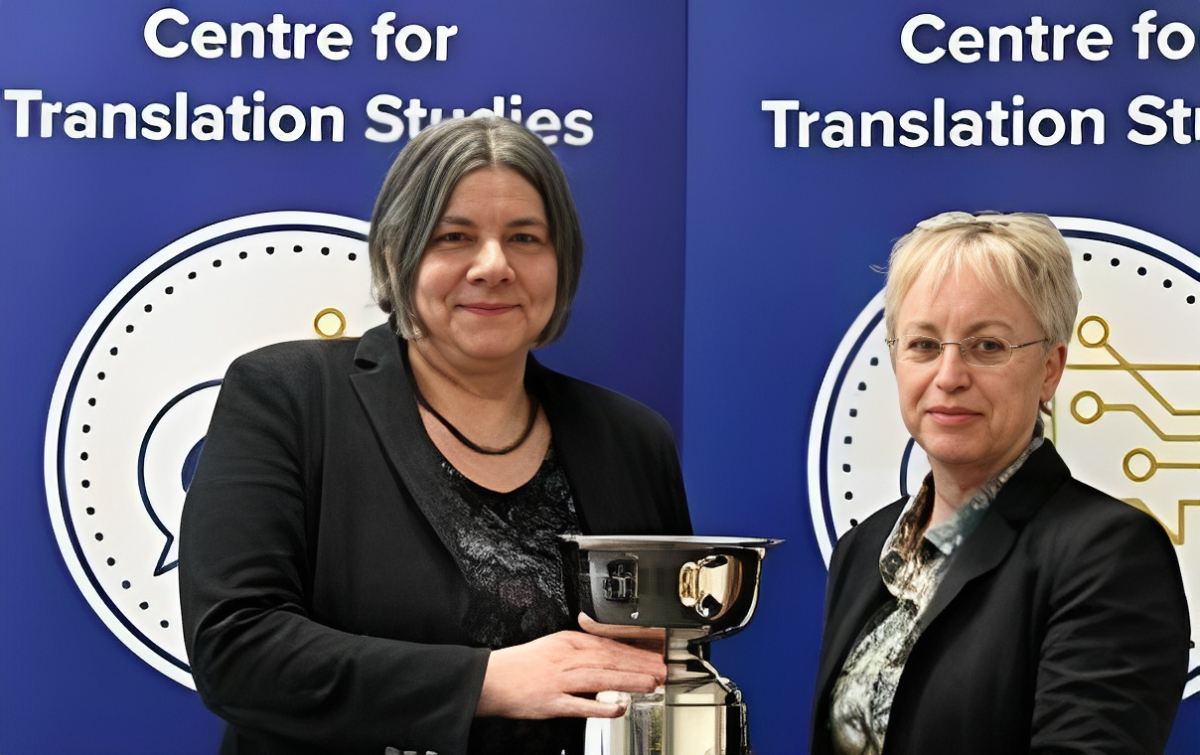
From left to right: Sabine Braun and Nicki Bone
SLATOR PRO GUIDE
Elena Davitti was interviewed by Slator: Language Industry Intelligence, alongside other experts in the field of speech-to-text services to contribute to the ‘Slator Pro Guide: Subtitling and Captioning’. This document also features a brand new video clip explaining the different workflows for live interlingual subtitling via speech recognition, which are placed on a continuum from more human-centric to semi and fully-automated. This video is aimed for the wider public and was created within the ESRC-funded SMART project (Shaping Multilingual Access through Respeaking Technologies, 2020-2023) with the support of the Surrey Institute for People-Centred Artificial Intelligence. If you are interested in key project findings in a nutshell, click here or get in touch with Elena (e.davitti@surrey.ac.uk) for the latest publications. You can follow us on X (@SMARTatSurrey).
INNOVATIVE PAPER BY CTS FEATURES IN HISTORIC ISSUE OF THE JOURNAL OF SPECIALISED TRANSLATION
The last day of July saw the publication of the latest issue of JoSTrans (The Journal of Specialised Translation), the most successful open access journal in the field of translation studies, celebrating 20 years of its publication. This was a non-thematic issue, garnering high interest and leading to a very strict acceptance rate (106 proposals, 13 of which were selected, amounting to a 12% acceptance rate). For all these reasons, it is a special privilege for CTS to feature as the first article of this issue.
The article in question is a piece of research for which academia and industry came together to study an element of automation being introduced to professional translation workflows. Written by Sarah Herbert whilst finishing her Translation MA at the University of Surrey and in collaboration with Félix do Carmo, Joanna Gough and Anu Carnegie-Brown (Sandberg), the article presents a study on the impact of automating the process by which translation jobs are allocated to the best providers.
The title of the article, ‘From responsibilities to responsibility: a study of the effects of translation workflow automation’, refers to the analysis conducted on the basis of responses from 38 translation professionals affected by the automation of a new job allocation system, which revealed different levels of awareness and concerns about job role responsibilities and professional responsibility.
HUMAN-INFORMED TRANSLATION AND INTERPRETING TECHNOLOGY CONFERENCE (HIT-IT)
This year’s edition of the Human-informed Translation and Interpreting Technology (HiT-IT) conference was held successfully in Naples, Italy from 7 to 9 July 2023, preceded by tutorial sessions on 6 July. Aimed at bridging the gap between those working in language automation and human translation practitioners, for the mutual enrichment of professionals from both fields, themes covered during the conference included user requirements for translation and interpreting technologies, the incorporation of human knowledge into automated processes, and the latest advances in terms of translation, interpreting and subtitling technologies.
Representing the University of Surrey were Constantin Orăsan, Félix do Carmo, Tomasz Korybski, Željko Radić, and Eleanor Taylor-Stilgoe of the Centre for Translation Studies. Félix do Carmo gave the first pre-conference tutorial on 6 July, on tools, resources and theoretical approaches to teaching neural machine translation to translators.
Tomasz presented his collaboration with Elena Davitti, titled ‘Effective Editing in Respeaking: Unveiling Uniquely Human Skills in Live Speech-to-Text Transformation’, on 7 July. The presentation centred around the live editing of speech during intra- and interlingual respeaking assignments. Eleanor also spoke on the first day of the conference, presenting a paper titled ‘An Exploration of Risk in the Use of Machine Translation in Healthcare Settings with Abbreviations as a Use Case’, which focused on investigating risk awareness among healthcare staff when using machine translation, with higher-risk medical abbreviations as a use case.
Constantin’s keynote presentation was held on 8 July. Titled ‘GenAI: the next step in the evolution of translation?’, it considered the impact of Large Language Models, such as ChatGPT and Bard, on translation and the translation industry. Ahmed Saeed’s paper, ‘Comparing Interface Designs to Improve Remote Simultaneous Interpreting Platforms: Insights from an Experimental Study’, was also scheduled for 8 July and presented by Tomasz. The presentation focused on the impact of the interfaces of cloud-based conferencing and interpreting platforms on the interpreters’ user experience in remote interpreting.
Željko presented ‘Introducing Speech Recognition in Non-live Subtitling to Enhance the Subtitler Experience’ on 8 July, focusing on participants' reception of a new subtitling technique, Interlingual Subtitle Voicing (ISV), along with the accompanying specialised software, SpeakSubz. Development of this software was then presented on 9 July, with the title ‘Developing a Customisable Subtitling Tool Based on Academic Research and User Needs’.
The conference proceedings, reflecting some of the work presented by CTS, are available here.
CTS JOINS A PANEL OF EXPERTS AT THE HOUSE OF LORDS TO DISCUSS THE USE OF MACHINE TRANSLATION
The All-Party Parliamentary Group on Modern Languages of the House of Lords (APPG-ML) met on 16 January to discuss the theme ‘A brave new world: Artificial Intelligence and Machine Translation and the implications for policy’. The meeting was inspired by the work undertaken by Neil Coulson (CEO of CommSOFT) in 2020, for which a Freedom of Information Request was sent to over 60 public sector organisations regarding their use of machine translation (MT). Along with Neil, the APPG-ML invited Sabine Braun and Félix do Carmo, representing CTS Surrey, to discuss and expand on some of the themes raised in an earlier article, provocatively titled ‘Death by Machine Translation?’. Presentations were also given by Lucas Nunes Vieira, and representatives of the Chartered Institute of Linguists, the Welsh Government Translation Service and GCHQ.
During the meeting, Sabine and Félix presented an overview of current and emerging research themes relating to the use of MT and language technologies. They debated the technological impact of overestimating the output quality produced by neural machine translation, the social impact of transferring all responsibility concerning the risks present in MT use to its users, and the economic impact of extractivist business models, for which no regulations are currently in place. They highlighted the risks of using MT as a substitute for interpreters in healthcare and other settings, and discussed suggestions for regulating MT in terms of fair use, including the protection of consumers’ and workers’ rights, society’s right to ownership of its own knowledge, and safeguards against the manipulation of such rights for unchallenged private use. The materials presented at the meeting are available here.
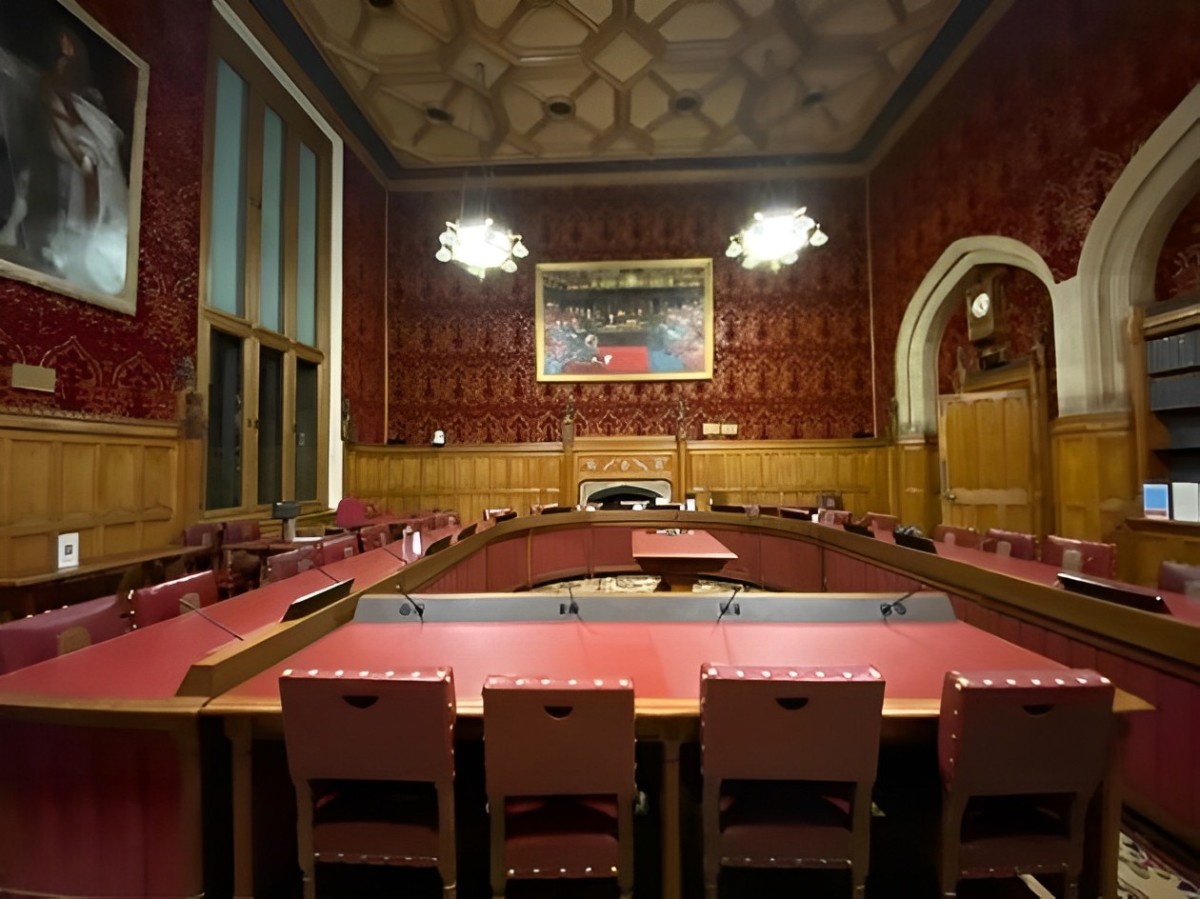
Image source: UK Parliment
SUB-TI PUBLIC ENGAGEMENT EVENT
Elena Davitti was invited to take part in a roundtable, with press and the general public, as a launch event for the “InCINEMA – Festival del cinema inclusivo” (InCINEMA – Inclusive cinema festival), the first Italian accessible cinema festival, an initiative by SUB-TI (one of the industry stakeholders in SMART) and MyMOVIES, in collaboration with Fondazione Sistema Toscana and FRED Film Radio. During this round table, Federico Spoletti (SUB-TI CEO), Annalisa Sandrelli (International Co-Investigator on SMART) and Elena discussed the concept of accessibility in relation to audiovisual content and provided an overview of research on this topic in Italy and Europe, before the accessible screening of a short film. (30 June 2023, Cinema La Compagnia, Florence)
LexiCom Cambridge 2023
Ana Frankenberg-Garcia was an invited speaker at Lexicom Cambridge 2023, an intensive workshop in lexicography and lexical computing. Speaking to participants from across the globe, she delivered a talk on “Lexicography for Writing” based on her work on the AHRC-funded ColloCaid project.
MACHINE TRANSLATION SUMMIT 2023
For a few weeks this summer, Félix do Carmo moved his office to Asia. He started by giving two lectures at the University of Macau, on 31 August and 1 September, at one of the most prestigious Departments of Portuguese in Asia. The first lecture was an introduction to the relationship between AI and translation, highlighting how variation, non-equivalence and differences between languages feed the need for human translation, even when we have powerful AI systems. The second lecture focused on how Large Language Models highlight the complexity and power of natural languages as the most efficient coding systems ever created. It also featured a discussion about managing risks of MT, as a clear requirement for future professional translators.
On 11 September, Félix delivered a lecture at the University of Rykkio in Tokyo, directed at translation students, teachers and professionals. One of the topics Félix discussed was how the increasing demand for translators to accept more responsibility is not adequately reflected in role descriptions or by improved work conditions.
Together with Masaru Yamada of the University of Rykkio, Félix also co-chaired the User Track of the 19th Machine Translation Summit, which was held between 4 and 8 September in Macau. Dorothy Kenny, Akiko Sakamoto, Kirti Vashee and Chan Sin-wai, among many other speakers, joined the event, creating many opportunities to foster collaboration across Translation Studies and Computer Science.
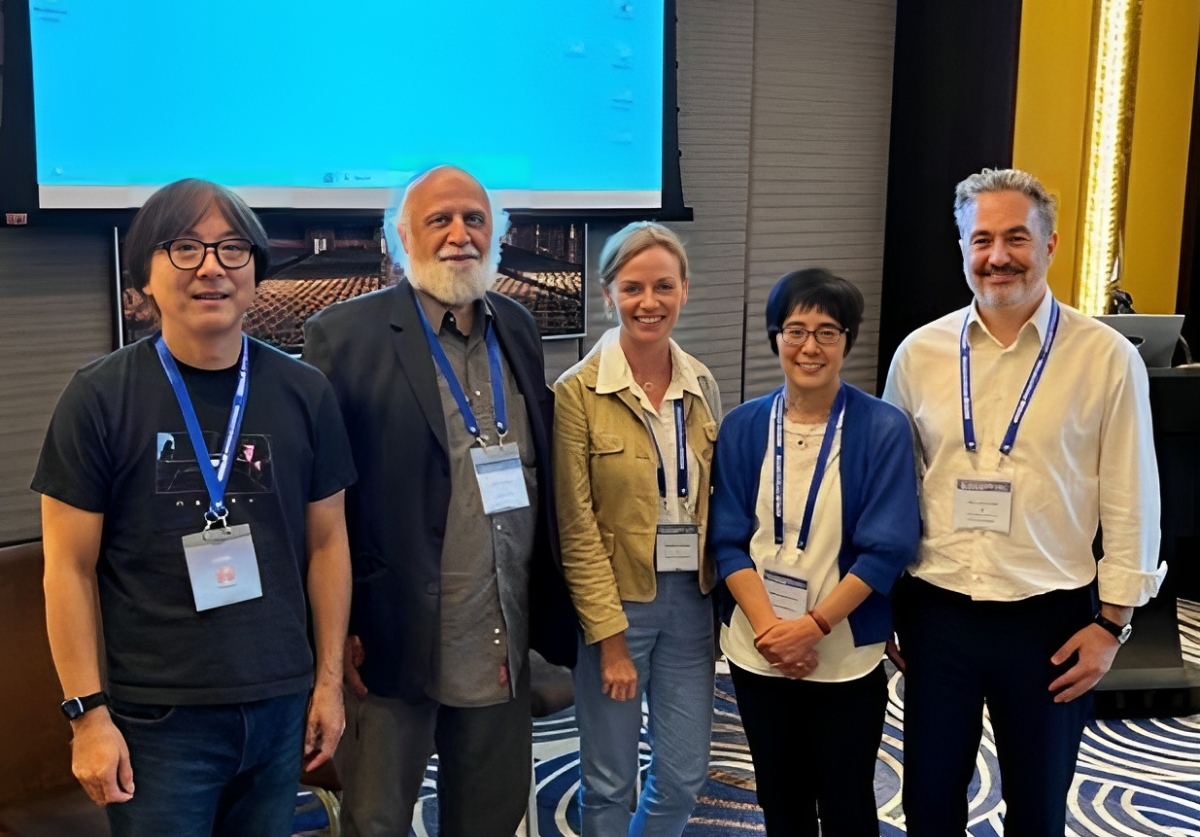
From left to right: Masaru Yamada, Kirti Vashee, Dorothy Kenny, Akiko Sakamoto, and Félix do Carmo at the XIX MT Summit
CTS CAREERS FAIR
In May, CTS had the pleasure of hosting our 7th Careers Fair. We had a great lineup of Language Service Providers, who created a wealth of networking opportunities for our MA students and collectively gave great insights into the diverse landscape of language services and the roles available in the language services industry. Thank you Surrey Translation Bureau, Mother Tongue, Wordbank London, Hogarth, Alpha, Oncall, Welocalize, Acolad group, Comms Multilingual Ltd and TransPerfect for the informative, engaging and fun afternoon!
NETTT 2024
The second edition of the International Conference ‘New Trends in Translation and Technology’ (NeTTT’2024) will take place in Varna, Bulgaria, 4-7 July 2024. The Call for Papers can be accessed at https://nettt-conference.com/
CONGRATULATIONS DR YI GU
Congratulations to Dr Yi Gu, who has recently completed her PhD in Translation Studies at CTS. In her research, Yi compiled ZHEN, a 2-million-word parallel corpus of Chinese translated into English, which she used to explore less well-known directional features of Chinese into English translation. The ZHEN corpus is available on Sketch Engine and Yi is happy to share it upon request (please contact her supervisor Ana Frankenberg-Garcia at a.frankenberg-garcia@surrey.ac.uk to request access).
Yi started her journey at CTS as a MA in Interpreting student in 2017. Her MA dissertation
exploring evidence of Chinglish in Chinese-English interpreting won the 2018 ITI Award for Best Academic Research.
Yi published a book chapter about her research with John Benjamins and presented a number of papers at international conferences during her studies at CTS.
Yi has recently relocated to France, where she holds a teaching position at the Neoma Business School in Reims and works as a freelance Chinese-English interpreter around Europe.
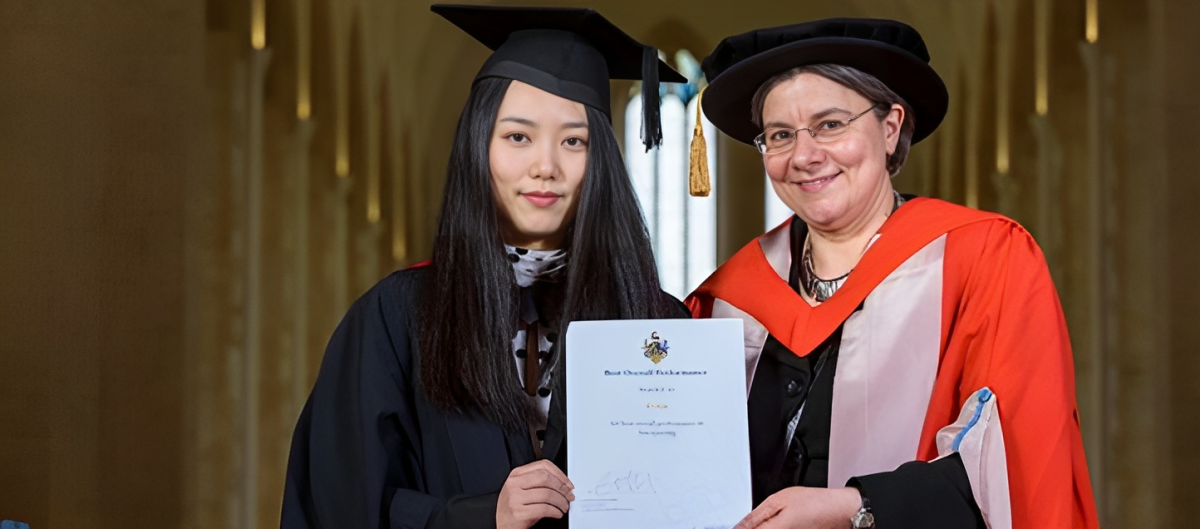
From left to right: Yi Gu and Sabine Braun
SEMESTER IN AUSTRALIA
Earlier this year, our PhD student Andreea Deleanu, who is working on the development of Accessible Cues aimed at making audiovisual content more accessible for people with learning disabilities, successfully secured funding from the UK’s new Turing Scheme to visit Macquarie University (Sydney, Australia). During her three-month stay, Andreea was able to work on her reception study material with Professor Jan-Louis Kruger, benefitting from his generously offered advice on all aspects of audiovisual translation and narratology relevant to her project.
“The Department of Linguistics at MQ welcomed me with open arms, and I was able to exchange ideas, doubts and hopes with PhD students and post-docs from all over the world. It was a wonderful opportunity to expand my knowledge and alongside my studies I managed to find the time to get lost along the Great Ocean Road, feed wallabies & grey kangaroos and take part in impromptu tactile experiences at the Sydney Art Gallery. I am grateful I was able to call this truly amazing country home this semester and would like to sincerely thank the Department of Linguistics and Jan-Louis Kruger for this valuable experience and knowledge exchange. Spending three months on the other side of the world made me appreciate how many opportunities are available for PGRs at CTS to broaden horizons, both at professional and personal level.”Andreea Deleanu (PGR)
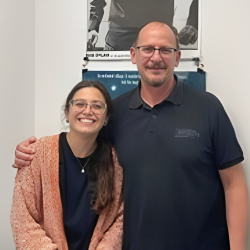
MAKING THE INVISIBLE VISIBLE
Our PhD students Olga Davis and Jisue Park, presented at Surrey’s Postgraduate/Early Career Researcher Conference, Making the Invisible Visible, in June 2023.
Olga presented her research on the topic of Audio Description: Assistive commentaries personalised for diverse audiences.
Jisue presented her poster on Comic Books in Translation: Process and Quality in Metaphor Translation and was awarded the People’s Choice Best Poster Presentation prize at the conference.
From left to right: Olga Davis and Jisue Park
CONVERGENCE LECTURE SERIES (ONLINE)
CTS kickstarted the new academic year with two Convergence Lectures. On 18 October Manuel Herranz presented ‘The Importance of Data Anonymisation to Build Ethical AI’ and on 30 November we welcomed Masaru Yamada to Guildford where he presented a hybrid lecture on ‘Enhancing Translation Accuracy and Efficiency through ChatGPT’. Thank you to both of our speakers for the inspiring lectures, which sparked insightful conversations about the rapid developments in AI-powered language technologies.
We are delighted to continue the series with upcoming lectures from Gloria Corpas Pastor and Joanna Drugan.
Wednesday 15th November, 16:30 (GMT): Gloria Corpas Pastor - ‘At a loss with technology? Some current research initiatives to assist (or even replace) interpreters’ REGISTER HERE
Wednesday 6th December, 16:00 (GMT): Joanna Drugan, Save the Date! More details to follow soon
WORK at CTS
We are recruiting! CTS are looking for a new Lecturer to join our wonderful team, in Guildford, Surrey. If you are interested in finding out more or would like to apply, please visit the link Lecturer in Translation Studies, applications close, 20th November.
If you would like to learn more about the role please do not hesitate to contact us cts_inquiries@surrey.ac.uk
Study at CTS
Are you interested in pursuing a Master’s degree at CTS? We are delighted to share our new MA programmes video with you.
If you would like to learn more about the opportunities to study at Surrey please do not hesitate to contact us. We invite you to stay connected with us through our social media channels and to share our newsletter with your network. If you no longer want to hear from us, please email cts_inquiries@surrey.ac.uk and we will remove you from our mailing list.
Thank you for your continued participation and support.
We invite you to stay connected with us through our social media channels and to share our newsletter with your network.
